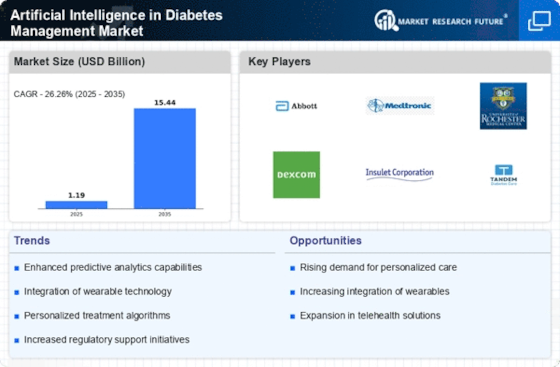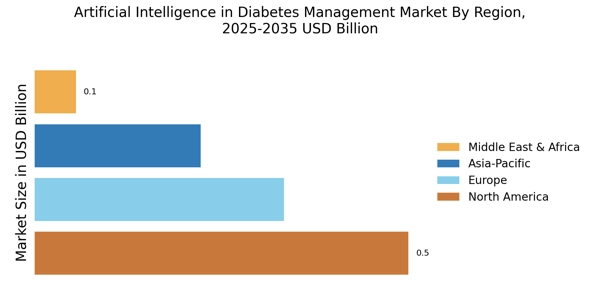Rising Prevalence of Diabetes
The increasing prevalence of diabetes worldwide is a primary driver for the Artificial Intelligence in Diabetes Management Market. According to the World Health Organization, the number of individuals with diabetes has risen significantly, with estimates suggesting that by 2030, approximately 578 million people will be affected. This alarming trend necessitates innovative management solutions, and AI technologies are emerging as vital tools in this regard. AI can assist in monitoring glucose levels, predicting complications, and personalizing treatment plans, thereby enhancing patient outcomes. The demand for effective diabetes management solutions is likely to propel the growth of the Artificial Intelligence in Diabetes Management Market, as healthcare providers seek to leverage technology to address the challenges posed by this chronic condition.
Increased Investment in Health Technology
Increased investment in health technology is a significant driver for the Artificial Intelligence in Diabetes Management Market. Governments and private sectors are recognizing the potential of AI to transform healthcare delivery, leading to substantial funding for research and development. This influx of capital is fostering innovation in AI applications for diabetes management, including predictive analytics and personalized treatment plans. As more stakeholders invest in AI technologies, the market is expected to witness accelerated growth. The emphasis on improving healthcare outcomes and reducing costs through technology is likely to further stimulate the demand for AI solutions in diabetes management.
Advancements in Machine Learning Algorithms
Recent advancements in machine learning algorithms are significantly influencing the Artificial Intelligence in Diabetes Management Market. These algorithms enable more accurate predictions and personalized treatment options for diabetes patients. For instance, machine learning models can analyze vast datasets to identify patterns in blood glucose levels, allowing for timely interventions. The integration of these sophisticated algorithms into diabetes management tools is expected to enhance their effectiveness, leading to improved patient adherence and outcomes. As healthcare systems increasingly adopt AI-driven solutions, the market for Artificial Intelligence in Diabetes Management Market is anticipated to expand, driven by the need for more precise and individualized care.
Growing Demand for Remote Patient Monitoring
The growing demand for remote patient monitoring solutions is reshaping the landscape of the Artificial Intelligence in Diabetes Management Market. With the rise of telehealth and digital health platforms, patients are increasingly seeking ways to manage their diabetes from home. AI technologies facilitate remote monitoring by providing real-time data analysis and alerts for both patients and healthcare providers. This shift towards remote care is particularly relevant in managing chronic conditions like diabetes, where continuous monitoring is crucial. The convenience and accessibility offered by AI-driven remote monitoring solutions are likely to drive market growth, as they empower patients to take control of their health while reducing the burden on healthcare systems.
Regulatory Support for Digital Health Solutions
Regulatory support for digital health solutions is emerging as a crucial driver for the Artificial Intelligence in Diabetes Management Market. Governments and health authorities are increasingly recognizing the importance of AI in enhancing healthcare delivery. Initiatives aimed at streamlining the approval process for digital health technologies are encouraging the development and adoption of AI-driven diabetes management tools. This regulatory backing not only fosters innovation but also instills confidence among healthcare providers and patients in utilizing these technologies. As regulations evolve to support the integration of AI in healthcare, the market for Artificial Intelligence in Diabetes Management Market is poised for substantial growth.





















Leave a Comment